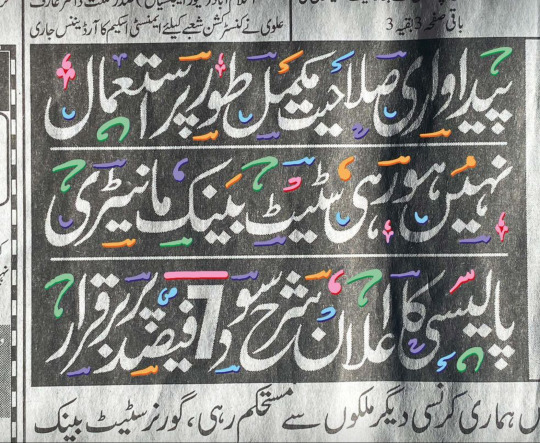#urdu newspaper
Text
بدعتی کی سزاکیا ہے؟ | Urdu News – اردو نیوز
ہفتہ 27 مئی 2017 3:00
عبد الستارخان
حضرت سفيا ن بن عيينہؒ نے بدعتی کی سزا پر ایسی بات فرمائی ہے جو آبِ زر سے لکھنے کے قابل ہے۔آپؒ فرماتے ہیں:
روئےزمین پر کوئی بدعتی ایسا نہیں بجز اس کے کہ اللہ تعالی اس پر اس کی بدعت کی وجہ سے ذلت ورسوائی مسلط کردیتا ہے۔ یہ بات میں نے کہتا بلکہ اللہ کی کتاب سے ثابت ہے۔
لوگوں نے پوچھا : اللہ کی کتاب میں یہ بات کہاں لکھی ہے؟۔
فرمایا : کیا تم نے اللہ کافرمان…
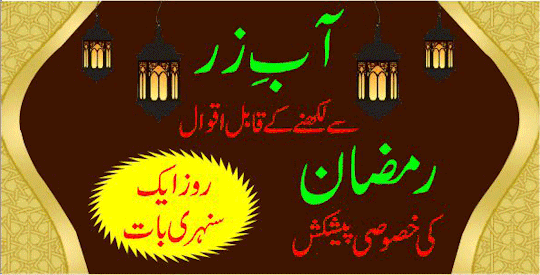
View On WordPress
#latest news#online newspaper#pakistan news#urdu#urdu epaper#urdu news#urdu newspaper#urdunews#اردو#اردو نيوز
0 notes
Text
#sports news in urdu#today sports news in urdu#latest sports news in urdu#daily sports news in urdu#sports news today in urdu#top newspapers in pakistan#cricket#badminton#football#soccer#squash
0 notes
Text
IND vs WI 1st ODI: Team India without seniors.. How will Shikhar's playing XI fare? | KKG INFO
IND vs WI 1st ODI: Team India without seniors.. How will Shikhar’s playing XI fare? | KKG INFO
The first ODI between India and West Indies will be played on Friday, July 22. Let’s see how the playing eleven of the Indian team will be in this match..
In IND vs WI 1st ODI, Indian team playing 11: After losing the ODI series against England by 2-1, the Indian team is now preparing to face the West Indies team. The Indian team is playing 3 ODI series and 5 T20I series in West Indies. India’s…
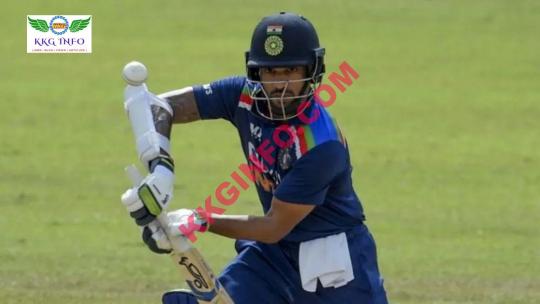
View On WordPress
#1st#best newspaper for cricket#cricket news upcoming match#cricket news yuvraj singh#fare#geo cricket news in urdu#IND#Ind Vs Wi#India#India VS West Indies#INFO#KKG#Nicholas Pooran#ODI#playing#ranchi cricket news#Rohit Sharma#seniors.#Shikhar Dhawan#Shikhars#Team#Virat Kohli#yahoo cricket news in hindi#yorkshire post cricket news
0 notes
Text
مریم نواز شریف ن لیگ کی شوشل میڈیا ٹیم کے فورمان سے خطاب کر رہے ہیں۔
مریم نواز شریف ن لیگ کی شوشل میڈیا ٹیم کے فورمان سے خطاب کر رہے ہیں۔
maryam nawaz images latest
maryam nawaz images latest
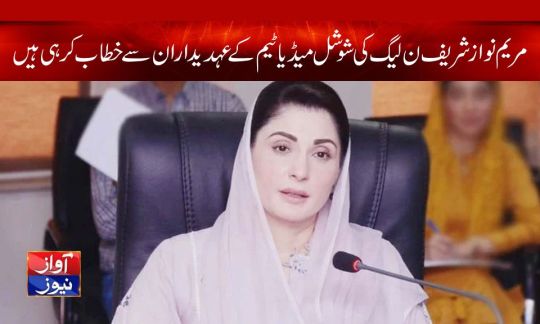
View On WordPress
0 notes
Text
The use of English shorthand and typewriters expanded towards the end of the 19th century in clerical work in the major cities of the subcontinent. The use of shorthand in Indian languages, however, developed not in the context of office work but to meet the requirements of the new public sphere, particularly the quick notation of public speeches for reporting in newspapers. This led to the invention of new speed scripts, atitvarene lihiṇyāchī paddhatī (very speedy writing) or laghulekhan (shorthand) in Marathi, which relied heavily on Pitman and Munson’s English shorthand. Arguably the first use was in 1874 by RB Gunjikar [...]. Gajananbhau Vaijya, an English shorthand writer and reporter with the Indian Statesman, invented another speed script expressly for the quick notation of speeches [...]. Notably, Indian-language shorthand remained in the sphere of handwriting, as typewriters for non-Latin scripts did not become widespread in the subcontinent until the mid 20th century. [...]
[I]t is actually Bhujangrao Mankar, inventor of a third shorthand script with the book Laghulekhankalā (1897), who announced himself on the title page as the creator of Marathi and Gujarati shorthand. Mankar was a well-known English shorthand reporter for the press and the Criminal Investigation Department (CID) in Bombay for all manner of political meetings in the early 20th century. [...]
---
As Bernard Bate noted, Tamil shorthand came into its own when the colonial government attempted to acquire written transcripts of possibly seditious speeches during the Swadeshi movement.
In Bombay, too, shorthand found widespread application in CID surveillance with the growth in nationalist meetings and activity in the 1920s. Sub-inspectors could learn Marathi shorthand as an optional subject in the Central Police Training School; the usual practice was to pass a test in the office and regularly test for speed.
In the trial of the Ali brothers in Karachi following the Khilafat movement, speeches by Mohamed Ali and Shaukat Ali were entered as evidence of their seditious activity.
Similarly, charges against Communist leaders SA Dange, RS Nimbkar, and others in the Meerut conspiracy case (1929–33) were also based on their public speeches.
The cross-examination of witnesses turned on the accuracy of the transcripts and the methods used to obtain them and provides a rich window into the work of memory, notation, and translation involved in producing a speedy verbatim transcript of a public speech, and the issues of legibility, authenticity, and transparency that linked scribe, script, and language to state surveillance.
---
Police reporters usually translated the shorthand transcripts of speeches in various languages into English longhand as soon as possible. In Karachi the Ali brothers’ Urdu speeches were recorded in Urdu shorthand. In Belgaum in June 1921, however, sub-inspectors of the Pune CID took down their Urdu and English speeches in Marathi shorthand. During a meeting in Bagalkot, also in northern Karnataka, Shaukat Ali’s speech in Urdu was orally translated sentence by sentence into Kannada as he spoke [...]. There was thus much processing of sound, meaning, and sign across languages, scripts, memories, and individuals, all at high speed. [...] The inspector [...] Deshpande mentioned a critical aspect of Pitman-based shorthand writing: since the signs matched specific sounds, he did not pay much attention to the content of the speech; he just noted down the sounds as best he could, even if he didn’t know the meanings of words. Gaps between sounds and meaning, it would appear, were filled in either during transcription through memory recall or by the CID itself. [...] These practices of notation, translation, and judicial discourse grappled with a spectrum of textual reproduction of oral utterances, from gist to verbatim.
---
Text by: Prachi Deshpande. Scripts of Power: Writing, Language Practices, and Cultural History in Western India. 2023. [Bold emphasis and some paragraph breaks/contractions added by me.]
78 notes
·
View notes
Note
I would love to learn urdu. Do you have any advice on how?
Great! Start from reading smaller articles from an online Urdu newspaper
. Secondly Find some Urdu speaking person with whom you practice Urdu speaking...
by the way your native language and origin??
Ch Anwar
3 notes
·
View notes
Text
My sister painted a memory
of rosy cheeks
and a dry Pakistani summer
in the youthful joy of a gated yard
where a rusting swing never stopped swinging
where the jamun tree painted our hands like grape colored henna,
the sundarkhani grapes sat green on our tongues.
Grass stains on our shalwars.
My mother laughs,
homemade preserves and toasted bread,
my grandmother laughs the same.
The light comes through a window,
shining on my grandfather’s seat
a newspaper in urdu held in his hands.
He laughs,
sweat drips on our brows,
mango ice cream down our chins
and tears stuck down faces,
lingering to the memory of years before.
Of the snapshot on a painting,
of the family far across the seas
of the place I always wanted to leave
and now wish I’d been back before
they left.
We’d pinch our cheeks to hold on
to the babies that once
laughed with my mother, grandmother and grandfather
and cried with them too.
#poetry#my poetry#my writing#poem#original writing#my sister is painting a photo of us and my grandmother in pakistan#and she has this distinct style of drawing children with big doll like blush cheeks#i really love it#anyways here’s a little poem based on it#i don’t love it but i’m slowly getting back to writing
8 notes
·
View notes
Note
I have some questions for Anika from the emoji asks ! 🍓🌹📖
TAHAAAA helloooo <333 i'm so happy that you landed on my ask box :') and yes, please ask away!!! :D
anika’s birthday special (closed, slow replies) | oc emoji asks
🍓 STRAWBERRY - do they eat their fruit & veg? what is their favourite fruit or vegetable?
Growing up, Anika was picky about the fruits and veggies she’d eat, either they weren’t prepared well or at that time, they got her sick so she was nervous of having them again, but she can now eat pretty much every vegetable except for bitter gourd. That shit’s nasty. And raw tomatoes.
Favorite fruit(s): Mango, specially Alphonso Mango, Coconut, and Strawberry
Favorite Vegetable(s) (other than potato): Carrots, Beans, Cauliflower and Spinach
🌹 ROSE - do they like valentines day? have they been confessed to before? have they confessed to anyone before?
As commitment-phobic as she is, Anika is always a fan of Valentine's Day.. she loves seeing couples being in love with each other and spending time. She was confessed to before by her previous Indian boyfriends during Valentine's Day (one when she was in middle school and one after Kakyoin during her PhD), but both of them were douchebags to her. With Kakyoin, the confession was mutual. However, the only person she's ever confessed to, was Jotaro.
📖 OPEN BOOK - do they like reading? what's their favourite genre?
Anika loves to read. It was how she was able to cope with her apraxia and her inability to speak for a while. TLDR: Anika had apraxia of speech and this made her unable to speak well until she was 6, so was a victim of bullying. She could even read the old newspapers that were being used for selling food on the street.
Her hunger and thirst for knowledge grew while she read different encyclopedias, some of them involving space. She’s a big fan of Shakespearean works, The Merchant of Venice being close to her heart. She even would read anthologies of English, Hindi and Urdu poems from writers like William Wordsworth, Rudyard Kipling, Premchand, Ghalib, and so on.
She’s a big fan of the Hunger Games book series when it was released in 2008 as she could relate to Katniss Everdeen. She likes the Harry Potter series too, but not as much as Karan who’s a big time Potterhead. She loves the works of Agatha Christie, Jeffrey Archer and Sidney Sheldon, and when she does start reading manga, she starts with InuYasha and Pink Dark Boy which is how Rohan and Anika befriend. 💖
#anika's ask games#countdown to anika’s birthday#<- that's the hashtag for the event haha#jojo oc#jojo self insert#shyna’s oc: anika sen#anika sen#noriaki kakyoin#jotaro kujo#oc emoji asks#thank you for asking tahaaa
3 notes
·
View notes
Text
Books read in May:
The Ministry of Utmost Happiness by Arundhati Roy: Easily the best book I have read so far this year. Experimental novels my beloved. The writing, of course, is beautiful and heart-wrenching and also really really funny. She uses irreverence both to sneer at nationalism and as a way of emphasizing the sadness and smallness of the ordinary concerns of her marginal characters. The whole story is different people for whom modern Indian society has no place coming together and creating a place for themselves, literally in a graveyard. The background and backdrop for many of these characters, and the story of their shattering that ultimately leads them to the graveyard, is Kashmir and anti-Islamic violence in Punjab. I definitely didn’t get everything in this book because I, as a white USAmerican, do not have the cultural and political context. And the book doesn’t spoonfeed that to you. I had to keep my phone handy to look stuff up, and I loved that. I think more books should decide that if the audience doesn’t know something that’s the audience’s problem. The dialogue is often in Urdu or Hindi, with the English translation following, which, again I loved. This book is definitely not for everyone, as it is very meandering and uses unorthodox methods of storytelling (a character finds a notebook, containing dark, tongue-in-cheek parodies of children’s reading exercises which together tell the story of a brutal day of atrocities. A newspaper relates a parable about futility and endless violence, but it is important who published the paper, and who is reading it, etc). But for me it’s now in my top 10.
The Taste of Sugar by Marisel Vera. This was a novel about a Puerto Rican couple in the late 19th c who lose their coffee farm after the American annexation and a disastrous hurricane, and are recruited by the US agents to go to Hawaii to farm sugar cane. I wanted to read this because I didn’t know anything about this history. I learned a lot! The author’s research was impeccable. Her writing was best when she was either giving sweeping descriptions of what was happening in a very zoomed out way (so, her description of the aftermath of the US annexation or the aftermath of the hurricane and the food shortages), or when she was writing a character speaking to another character as an uninterrupted monologue. Unfortunately, I found the way she constructed her characters fairly jarring. The main woman was written like a heroine from a romantic comedy, and this story was very much not that. I think her feeling constantly out of place was intentional but for me it didn’t work. I also... so this may just be me being a privileged asshole who is used to being catered to. But. She also had much of the dialogue in Spanish (as in, whole pages/paragraphs), but there was no translation, and (this would be on the publisher) no indication that the book was bilingual. So I wound up having to look up a lot of stuff, but not in a way I found... conducive to the reading experience or helpful. I did learn some phrases though, so that was cool! She also did something which felt kind of uncomfortable, which was giving the main male character a black half-brother who, for the first half of the book, only existed so the mc could show off how nice and good he was. This brother then turned out to be gay in the last... 10 pages, and nothing was done with it other than a very poorly executed “oh shit I think I like guys” moment... and then he gets sentenced to hard labor and we never learn if he survives. She also revealed that the mc’s mom and her “companion” were in a relationship right after these two women get up and walk out into the worst of the hurricane for NO REASON and die. And like... I get that you want to include gay people in your stories. But please practice more before attempting. I also wish she had spent more time on what happens to them once they’re in Hawaii, and the nascent friendship/organizing beginning to happen with the Japanese workers. She did give her women characters friends though! Which was nice! Glad I read it, but don’t plan to read it again.
Good and Mad: The Revolutionary Power of Women’s Anger, Rebecca Traister. I wanted this to be a different book than it was. I thought it was going to be a deep dive into the politics etc of anger and women. There was some of that, though most of it was pretty surface level. Mostly it was the author processing 2016-2018. Reading her hopes and expectations in 2022 was... disheartening, knowing, for example, that many of the women running for office in 2018 lost, knowing how the 2020 primary turned out, being in the middle of the metoo backlash, etc. She says at the end she wrote this in 4 months, and it shows. There were also so many places where she almost landed on some really scintillating analysis and fell jussst short of it, and instead either left it on an open question, or landed on an analysis which was fine but, imo, not quite there. Which is always frustrating. I think it’s a good feminism 101 book for someone who is outraged by the misogyny they see around them but is having trouble shedding the patriarchal discomfort around actually being mad at men. Traister is straight and happily partnered with a man, and she discusses how she balanced that with her anger at men as a class post 2016, and how her partner was supportive. Which is nice. However, not something I got much out of.
Swamplandia! Karen Russell. Did Not Finish. This is the converse of the NK Jemisin short stories. I love Russell’s short stories. Vampires in a Lemon Grove sold me on short stories as equally valuable to novels! Her long fiction is terrible. This is just... she read Bastard out of Carolina and was like “oh but what if this were whimsical and in Florida and straight” and nobody stopped her. Honey, you are not Dorothy Allison and you never will be so stop. Pacing was awful, tone was all over the place, it felt like multiple short stories had collided in a bad way. Her narrator’s voice was great! But the plot was just horrendous. WHY did she think a graphic sexual assault on a 13/14 year old was appropriate to include in a book that frequently indulges in being silly?? I know why, it’s because this kind of storytelling where silliness and unspeakably awful things juxtapose is a stable of a certain type of southern literature, but her execution of it was SO BAD. This could either have been a fun humorous book about a kid trying to save his family’s outdated and dysfunctional alligator theme park by working at not-universal-studios, or it could have been a good gothic horror story about two teen girls left alone in the Everglades being lured into the swamp by dubiously intentioned ghosts and men. But she tried to make it both and it sucked.
6 notes
·
View notes
Text
Hello Everyone,
Assalamoalaikum ❣️
As you all know today is 9th November, that is, today is celebrated as Urdu Day. On this day in 1877, the famous poet Dr. Allama Iqbal was born in Sialkot Pakistan, and today Urdu Day is celebrated to mark his birth anniversary. His father's name was Sheikh Noor Muhammed and his mother's name was Imam Bibi. The financial condition of the house was not that good, it just used to pass. His father was not very educated, his job was that of a tailor, he used to stitch clothes of people and run the house, but yes he was not educated but he was a very religious and social person.
Do you know, Urdu is an Indo-Aryan language that comes from the Indo-European language family. It is the mother tongue of about 70 million people worldwide and more than 100 million people use it as a second language in India - Pakistan. Urdu is a language that reaches the soul. It is a language that fills life in ghazals. This is the reason why songs, poetry and nazms written in Urdu reach our hearts.
You must have heard that a proverb is very famous in India. Regarding languages, it is said that if Hindi is our mother then Urdu is our aunt. This clearly shows how much importance is given to languages in India. Also, how is the importance of Urdu in it, it also shows.
The birth of Urdu in India is considered to be from the period of 12th century. At that time the popular name of this language was not Urdu but Hindavi. When the number of its speakers increased rapidly and it started being spoken in different states, then its different names also started appearing, such as- Zaban-e-Hind, Rekhta, Zaban-e-Dehli, Hindi, Gujri, Deccani, Zaban-e-Urdu-e-Mullah and Urdu.
I believe that Dr. Allama Iqbal through his poetry worked to advance the Urdu language to a great extent. He used Urdu and Persian languages extensively in his poetry. His poetry was not easy for everyone to understand. Because he did not do common poetry, in which those who read and listened could see the words of the lover, he was a revolutionary poet, his poetry used to be filled with the philosophy of life. There used to be many mines in every single harf.
There is no doubt that Dr. Allama Iqbal was a true patriot, he wrote many such ghazals in which the flame of his patriotism can be felt. When he wrote "Tarana-e-Hind" in 1904, that ghazal was on the tongue of a revolutionary. Even today that Ghazal is repeated in every corner of India.
Sare Jahan Ae Achcha Hindustan Hamara
Hum Bulbule Hain Iski Ye Gulistaan Hamara
Mazhab Nahi Sikhata Aapas Mein Bair Rakhna
Hindi Hain Hum Watan Hai Hindustan Hamara...
Well, in today's era, all of you must have also realised that somewhere in our country, in some way or the other, efforts are being made to eradicate Urdu, and this is also true that without Urdu, All Stories, Ghazal, Nazm, Song and Poetry are all incomplete. Without Urdu, they cannot accomplish all these things, but still do not know why some people are lying on erasing Urdu. So I request special Muslim brothers and sisters to try to keep Urdu alive in their society in their homes and get their children educated in Urdu and take Urdu newspapers or magazines in their homes. Today we all ourselves are getting away from Urdu as if it will no longer exist in the future.
What a great poet has written a lot on Urdu;
"Urdu" Jise Kehte Hain Tahzeeb Ka Chashma Hai..
Wo Shakhs Mohazzab Hai Jisko Ye Zuban Aayi !!
Thank You !! 😊
S S Ashraf
Director, Bookstock

3 notes
·
View notes
Text
آئل ریفائنری سمیت پاکستان میں معاہدوں کا اختیار وزراءکو تفویض
منگل 12 فروری 2019 3:00
ریاض۔۔۔۔ سعودی کابینہ کا اجلاس منگل کو خادم حرمین شریفین شاہ سلمان بن عبدالعزیز کی زیر صدارت ریاض کے قصر یمامہ میں منعقد ہوا۔کابینہ نے تجدد پذیر توانائی کے منصوبوں کوجدید خطوط پر استوار کرنے ، آئل ریفائنری، پیٹرو کیمیکل اور معدنیات کے شعبے میں پاکستان کیساتھ مفاہمتی یادداشتوں کا اختیار وزیر توانائی و صنعت و معدنیا ت کو تفویض کردیا۔ اس کے بموجب خالد الفالح پاکستان کیساتھ…

View On WordPress
#latest news#online newspaper#pakistan news#urdu#urdu epaper#urdu news#urdu newspaper#urdunews#اردو#اردو نيوز
0 notes
Text
Validity Of Triple Talaq
A divorce is the legal separation of a married couple. Consequently, the divorce process is challenging for all parties involved, including the divorced spouses. As the urdu word for divorce, talaq refers to the practice of divorcing one's spouse three times in a single sitting, also known as Triple Talaq. If a woman is not menstruating or in a state of chastity, she is deemed innovative (or evil) (tuhr).
Read Supreme Court Judgements
Talaq is a controversial topic in Muslim personal law, which the author investigates in light of recent events. To end this discriminatory practice, a legitimate reading is given to Articles 14, 15, and 21. The researcher also sought to provide a worldwide perspective on the Quran-based practice of Triple Talaq. Shayara Bano v. Union of India and Others found triple talaq to be unlawful.
The purpose of this study is to provide a critical evaluation of the 'Triple Talaq' dispute. It is believed that this will educate law students about the divorce norms of Muslim personal law.
Analysis
The majority of the source material for this study comes from secondary sources, such as papers, books, journals, committee reports, newspaper stories, statutory provisions and norms of law, legal doctrines, regulatory authorities' published guidelines, etc.
In Islam, divorce is considered a necessary evil rather than a sin. Among all authorized actions, Talaq is the most abhorrent to God, according to a Hadith (professor's saying).
Talaq is an Arabic term that means "repudiation or untying" The second the word "Talaq" is uttered, the divorce procedure begins, and the wife is not need to be present. Talaq, as stated in Moonshee Buzloor Rahim v. Laleefutoon Nisa, is an arbitrary act perpetrated by the Muslim husband, who, according to Muslim Law, may divorce his wife at any moment, with or without cause. He need not be there with his wife in order to pronounce Talaq. Despite the fact that marriage is a civil contract that can be dissolved if neither party fulfills the contract's stated purpose, it is essential to respect and honor marriage, which should last as long as feasible.
In Islam, "Talaq," or divorce at the request of the husband, has two meanings: "Talaq-al-sunnah" and "Talaq-e-biddat." Is 'Talaq al-sunnah' a version of 'Hasan', in which three proclamations are made during three successive 'Tuhrs' (periods of the wife's purity) and Talaq is irreversible after the final proclamation? In addition, there is the option of 'Ahsan,' which requires a single Talaq to be delivered during the wife's 'Tuhr,' or the time between her menstrual cycles, and that the divorce becomes final after three 'Tuhrs.'
Regarding divorce, the 'Talaq-e-biddat' or 'Triple Talaq' is regarded as an uncommon practice. It is considered one of the most immoral acts by Mohammedan jurists, and it is outlawed in the United States. According to Ameer Ali, in the second century of the Muhammadan era, the Omeyad Monarchs adopted Talaq-e-biddat.
Triple Talaq occurs when the word 'Talaq' is uttered simultaneously, during the same meeting, or again during the same tuhr period.
In regards to divorce, Islam offers husband and wife equal rights because it views marriage as a civil contract. When the husband begins the divorce, it is known as "Talaq," when the wife initiates it (as was the case prior to the reforms of the Mussalman Law of Divorce), it is known as "Khula," and when both parties initiate it, it is known as "Mubaaraab."
Scripture and Triple Talaq
Regarding the Quran and Triple Talaq, the Quran does not indicate that a single Triple Talaq consists of three Talaqs.
6 As stated in verses 229-230 of the Holy Quran, a maximum of two divorces is mandated to prevent erratic and sporadic separations and reunions. Reconciliation is conceivable after a second divorce, but a third divorce is irreversible until the woman marries another man and he divorces her.
Marrataan (twice) indicates repetition in this verse "Talaq' or to give a divorce, with the number of times it was pronounced being stated.
Talaq, Talaq, Talaq, or the "three Talaqs""
They are considered to be three when spoken or uttered. Instead of repeating the word "Talaq," "marrataan" means to issue a second Talaq.
As Shams Prizada argues in his book "Triple Talaq in the Light of the Quran and Sunnah," the Arabic word "marrataan" never refers to a literal repetition of a sentence when it means "on a second occurrence following the first." Talaq-e-Bidat is considered the most immoral and ingenious kind of divorce because it opposes both the letter and spirit of the Quran and was forbidden by the Prophet Muhammad (PBUH).
In verse 230 of the Holy Quran, the husband is admonished not to damage marital connections if he has an outpouring of passion or rage. Al Ghazaalee once stated that divorce is acceptable in Islam only for valid reasons and in extreme cases of necessity, and not for the purpose of causing the wife grief or harassment.
In his book "Religion of Islam," Mohammed Ali stated, "The notion that a Muslim husband may divorce his wife based on his whims is a serious misunderstanding of the Islamic Institute of Divorce."
Although this is the current reality, the majority of Triple Talaq occurrences (reported) were the result of a spouse's violent outburst or trivial argument. Talaq-e-Bidat is the most unethical and artificial form of divorce in Islam, as it violates the Quran and is forbidden by the Prophet (PBUH). Consequently, in light of Quranic scriptures, it is essential that Triple Talaq is not regarded as a valid component of Muslim Personal Laws, as it contradicts the clear commands of the Holy Quran.
Judicial Pronouncements
After decades of protests by Muslim women, the Islamic tradition of Muslim men immediately divorcing their wives has been ruled illegal and null and void. The Supreme Court was petitioned by seven victims and a women's group. Particularly male religious officials have fought progressive Muslim women's efforts to end the practice of forcing men to divorce their wives.
According to activists, a lack of fundamental awareness among India's Muslim community has made it harder for women to organize legal and social campaigns challenging this practice. In the event of an immediate Triple Talaq, attempts to restore the marriage are impossible and will never occur, leaving the divorced woman to fend for herself.
As of the date the declaration was presented, may the fact that a husband filed for divorce without alerting his wife in writing constitute grounds for divorce? In the other case, Shamim Arsa v. Uttar Pradesh, this question arose. According to the judge's decision, a husband's written divorce declaration does not constitute Talaq; therefore, it cannot be declared that Talaq takes effect when his spouse makes the written statement of divorce public. The judge observed in her dicta that no ancient Muslim holy book or scripture bears a reference to a form of divorce sanctioned by the High Court and the Family Court.
No affidavit or pleading has been brought to our knowledge that specifies that the date the woman learns from the copy of the husband's affidavit or pleading that he has already divorced her on an indeterminate or specified date would be deemed the date of the effective divorce."
On the contentious topic of Triple Talaq, the Allahabad High Court, which oversees issues regarding Muslim personal law and is home to nearly 19 percent of India's Muslim population, has decided strongly in favor of Muslim women.
In October 2015, a Supreme Court panel examining a case involving the Hindu Succession Act requested the formation of a separate court to investigate whether Muslim women face gender discrimination in divorce procedures. A lawyer, Mukul Rohatgi, was hired to assist with legal objections to the legality of triple talaq. The administration's opposition to triple talaq has been vocal.
In May of 2017, a Constitutional Bench of five judges was constituted to review the matter. The court contacted the All-India Muslim Personal Law Board (AIMPLB) to see if they would let women to reject Triple Talaq.
In another case, Masroor Ahmed v. State, the so-called customary law situation of Muslim women is deemed offensive. Consequently, all Muslim women's organizations have criticised customary law for allegedly violating their human rights. They want Shariah (Islamic personal law) to be applied to them as well. Upon the establishment of Muslim Personal Law, they will attain their rightful position. If this measure is passed, it will have a hugely positive impact on society by clearly establishing the rights and responsibilities of the public."
As evidenced by these words, Indian judges no longer surrender their sense of justice to the whims of Islamic clerics and political correctness. Due to the AIMPLB's concerns claiming the practice dated back 1,400 years, the court determined the practice to be unconstitutional in August 2017.
Thus, it must be determined that the Supreme Court of India's ruling in Shayaro Bano v. Union of India violates Article 14 of the Indian Constitution. Because the 1937 Act recognizes and enforces Triple Talaq, it falls under the description of "laws in operation" as stipulated in article 13. Therefore, it must be repealed because it is invalid for recognizing and executing Triple Talaq. The learned Attorney General and those who supported him argued that Section 2 of the Muslim Personal Law Act of 1937 discriminated against non-Muslims in these situations. However, we see no basis to reiterate this judgment because it has already been deemed arbitrary.
Conclusion
By virtue of the practice of triple Talaq, Muslim males can divorce their wives without their agreement. This discriminatory practice deprives women of economic security, legal protection, and social support. They are guaranteed equality and a fair standard of living under Articles 14 and 21, respectively.
In A.S. Parveen Akthar v. Union of India, the Supreme Court of India upheld the legitimacy of Triple Talaq, dealing a serious blow to fundamental liberties. Individuals have a constitutional right to privacy, as outlined in Articles 14, 15, and 21, and this clearly falls short. Equal opportunity is a pillar of the democratic system in India.
Equal opportunity is, according to the Supreme Court, a fundamental tenet of the Constitution. Article 15(1) of the Indian Constitution bans state discrimination based on religion, race, gender, or any combination thereof. Article 15 is violated by this form of talaq since it discriminates against women based on their religion and sexual orientation. Article 21 of the Constitution states that a person's right to life and liberty may only be denied by law. The Triple Talaq jeopardizes the validity of Article 21 by deviating from the customary divorce arrangement.
In response to the Supreme Court's momentous decision invalidating the centuries-old practice of Triple Talaq, the government has begun steps to criminalize it. The Rajya Sabha of India is still discussing a bill that was passed by the lower house but has not yet been adopted by the upper house because it criminalizes divorce even if the wife is not evicted or separated from her husband.
Following the unexpected judgment by the Supreme Court to outlaw the centuries-old practice of Triple Talaq, the government has begun steps to criminalize this practice. The lower house of India's parliament has passed the Talaq-e-biddat law, however the upper house has not yet confirmed it due to concerns regarding some of the ideas.
The constitution authorizes states to adopt measures to improve the position of women. India has ratified a number of international conventions and protocols designed to promote gender equality in society. The Convention on the Elimination of All Forms of Discrimination Against Women has been ratified by India (CEDAW).
The Convention on the Elimination of All Forms of Discrimination against Women prohibits triple talaq (CEDAW). To comply with the Convention on the Elimination of All Forms of Discrimination Against Women, India must pass legislation safeguarding Muslim women from unintended divorce and guaranteeing them the same rights as men.
There is an urgent need for comprehensive, directive-compliant legislation. Due to the progressive nature of Islamic law, it may serve as the basis for a uniform civil code. While the Quran states that men and women are equal, traditional Muslim society has limited this to its own level and enacted a number of rules restricting the rights of women.
Despite advancements in other nations, the ULEMA acknowledges that women have not yet achieved full equality. If the state adopts a Uniform Civil Code, this disparity could be corrected for Muslim women. When the Talaq legislation is repealed, all members of the community will have equal access to justice and be treated equally.
2 notes
·
View notes
Photo
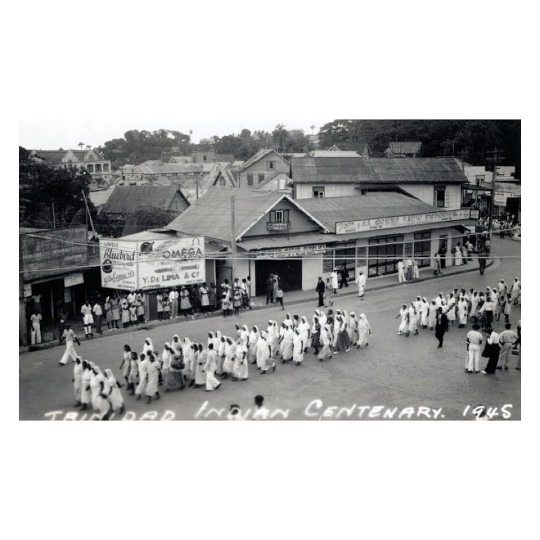
Wishing all my Trinidadians and ancestors a Happy Indian Arrival day 🔁 • @cutlassmagazine This picture captures the first Indian Arrival Day celebration in Trinidad on May 30th, 1945. The “East Indian Centenary” marked the 100th year of Indian presence in the nation. It took place in Skinner Park, San Fernando, and local leaders like Adrian Cola Rienzi (Krishna Deonarine) were present. Written statements from public figures, such as Gandhi, were read. But the festivities soon waned. By the 1970s the Divine Life Society, a Hindu sect, was the only group continuing the practice. It was named “Indian Emigration Day” and found little attention beyond the town of Chaguanas. There was a shift after the Indian Revival and Reform Association (IRRA) was founded in 1976 to tackle racism towards Indians and promote the culture. In 1977, an IRRA panel was assembled with Rajiv Sieunarine, Azamudeen Jang, Khalique Khan, Ramdath Jagessar, Anand Rameshwar Singh, Rajesh Harricharan, and Michael Shankar. The next year Rajnie Ramlakhan, Ashok Gobin, and Anand Maharaj joined. They issued a pamphlet in 1978 outlining the very beginning of Indian indentureship in 1845. It listed the names of the “jahajis” aboard the Fatel Razack ship and covered their history. The Trinidad Express newspaper promoted the document while The Guardian published an article by Kusha Haracksingh about the journey on the “kala pani” (black water). San Fernando Secondary School also held an event and the television show Mastana Bahar aired an Indian Emigration Day special. The IRRA worked with the Secretary General of the Sanatan Dharma Maha Sabha (SDMS), Satnarayan Maharaj, on a showcase at Lakshmi Girls Hindu College, an SDMS-founded school, on May 27th, 1979. To recognize Indians as citizens, and not just emigrants, they jointly agreed to adopt the title “Indian Arrival Day” from then. Source: Scott He and Project Gutenberg #indocaribbeanculture #indocaribbeanhistory #hindi #urdu #hindiurdu #bhojpuri #hindustani #caribbean #westindies #westindian #southasia #southasian #desi #indian #eastindian #india #trinidad #trinidadandtobago https://www.instagram.com/p/CeL0Ssho-f4ZgBwR4qXDzSCY6BB3b8TEw5NPzg0/?igshid=NGJjMDIxMWI=
#indocaribbeanculture#indocaribbeanhistory#hindi#urdu#hindiurdu#bhojpuri#hindustani#caribbean#westindies#westindian#southasia#southasian#desi#indian#eastindian#india#trinidad#trinidadandtobago
2 notes
·
View notes
Text
Grocery List
Remember to get raw meat—the kind that resembles the palms of your hands before they turn into angry fists; also, get tomatoes, you’ll know it’s good when it’s as red as your face like when you’re about to burst out of frustration; bite your own tongue, nobody believes a girl your age, instead, pick up some cow tongue for tonight’s curry; leave your heart to rest at home, people become greedy and grabby over things that aren’t theirs; grab milk, skip the skim, you’re not here to impress anyone; get this brand of chai masala, the one that impresses a man, but not enough to make him stay; skip the clothing store; find a salwar kameez cut from the same cloth as you and me, it’s cheaper that way; make sure you grab a newspaper on your way back; don’t stay out too late, it gets dangerous; have you heard about the mother who intentionally broke her daughter’s leg to save her? no amma, and please don’t do that to me, I promise I'll come home to you every night, just like I always do, I have nowhere else to go; only buy this particular brand of sugar, it’s sweet enough to satisfy a man’s desires yet respectful enough to safeguard a woman’s integrity; your split ends need attention; get bhringaraja oil, almond oil, and alma oil—specifically Dabur Vatika, not Parachute, that’s what you’ll need to grow hair long enough to keep you warm on cold nights, when there’s nobody to hold you; no need for jasmine perfumes; bottle your sadness into a scent, like the salty oceans out front; pick up some basmati rice; it’s just around the corner from the mishti store—what, you don’t know where it is? no, ma, there’s nothing there, the mishti store hasn’t been around for years; there was one, at least when I was younger; it must have been Pakistan that razed it to the ground; flames would seep from ruptured points and exit wounds on the streets as I made my way home from school; did you know they would sell rasgulla and rajbhog for a couple hundred taka? just like the amount your parents sold you off? Was it love then?; Mamoni, if it’s love that you’re looking for, you won’t find it for sale anywhere, true love only exists in poetry and books; can’t I buy books and read it out loud enough times until it becomes real enough for me to hold it in my hands?; mark off the food mold at the top of the list; it seems like it’s already shaped you into the woman you needed to become; don’t flash anger on me; anger is what a man exhibits when feeling insecure; are you any less than a man? no, amma, but sometimes I feel lesser than the lizards that crawl out inbetween the cracks of our walls at night; it’s not cruel; our ammas make us do this too, turning us into constant wars in our minds with no clear sight of the goal and out of reach; don’t look too deeply into the man with kajal under his eyes, dressed in a black kurti, even if he greets you with his hands down; he’s not the type to pen dramatic shayaris for you during arguments; he’s fluent only in Hindi, can’t even read Sanskrit, while you effortlessly weave poetry in Bengali, Hindi, Arabic, and hold onto the little Urdu you know, only because I raised you that way; he won’t opt for rickshaws or autos when you can easily walk the 8-minute distance to the grocery store; he’ll buy you the saris; he’ll buy you the jhumkas; he’ll even buy you the mendhi but won’t learn how to apply it for you; he won’t treat you to pani puri from the street vendor outside or let you coax the older bhai to add more chili powder to the mysterious liquid that’ll most definitely give you food poisoning; he won’t center your bindi for you; won’t allow you to adjust the collar of his kurti; doesn’t even consider offering you the last samosa; he’s a man raised among girls who were taught that their thoughts speak louder than words, and sometimes, not to speak at all; he won’t let you experience the freedom you have with me; don’t even entertain the idea of leaving me; oh, and one last thing, don’t forget to wear that dupatta; you always forget; sometimes, I think you do it deliberately to upset me
#excerpt from a book i'll never write#spilled ink#thoughts#writers on tumblr#poetry#writers creed#anger#desi tumblr#desi aesthetic#desi core
1 note
·
View note
Text
6th May 2024
5:58 P.M.
"Day 651"
One of the very childhood films...Zathura... 🚀 🌌 👾👽...I always liked it...not only because of the film on space and all but also because of that relationship... beautiful relationship shown between two brothers...it always ❤️💖✨🥰 reminds me of Manu didi❤️ 🤗...
And read it....written by Dr. Shriram Nene...such a good thought.. being simple is the best thing you can do to yourself... 😊🍀..
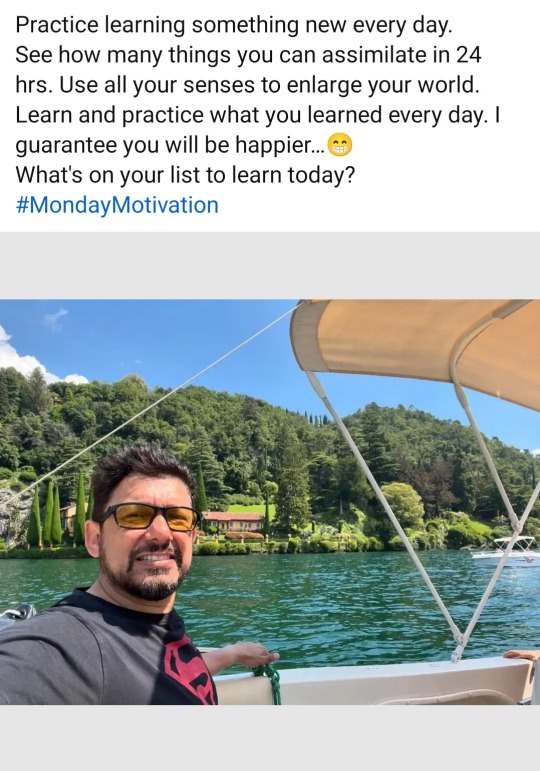
And read this story about Mr. Abu Noman who lives in Delhi and is helping to make Urdu literature alive through his risala (journal) Rehnuma-e-taleem-jadeed.. ❤️💖✨✨...this article was from Hindustan Times ..written by Mr. Mayank Austen Soofi...
A big...big and bigggggggg....thanks to him because not only to portray such beautiful people to the world..🌎🌍 but..
For risala... 😂 This was a word I heard from my grandfather Mr. Manohar Lal Mehta..he was very fond of reading and writing....he came in 1947 in Bhatinda... in Delhi in 1960 in Railway colony, TKD as yard master..he in old age used to write ✍️ Urdu poetry, good literature or good thoughts 🧐💭 in his registers from newspapers../ akhbars🗞️ and from journals/risala he use to order specially for him...it reminded me of him and his risalas..... ❤️ 🤗..
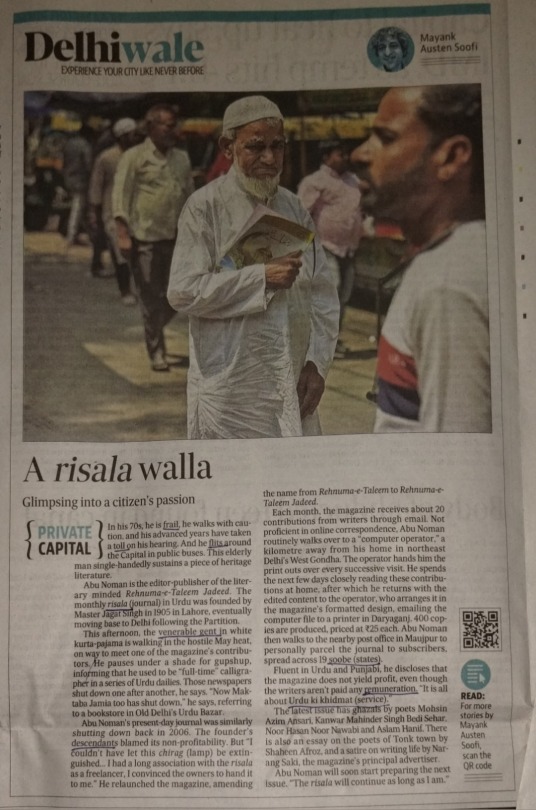
My grandfather ❤️...10 Rs. pleasee....🪑🤗...
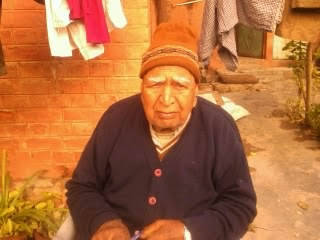
And today... betuuuuuu ❤️💖✨✨💫🌺...
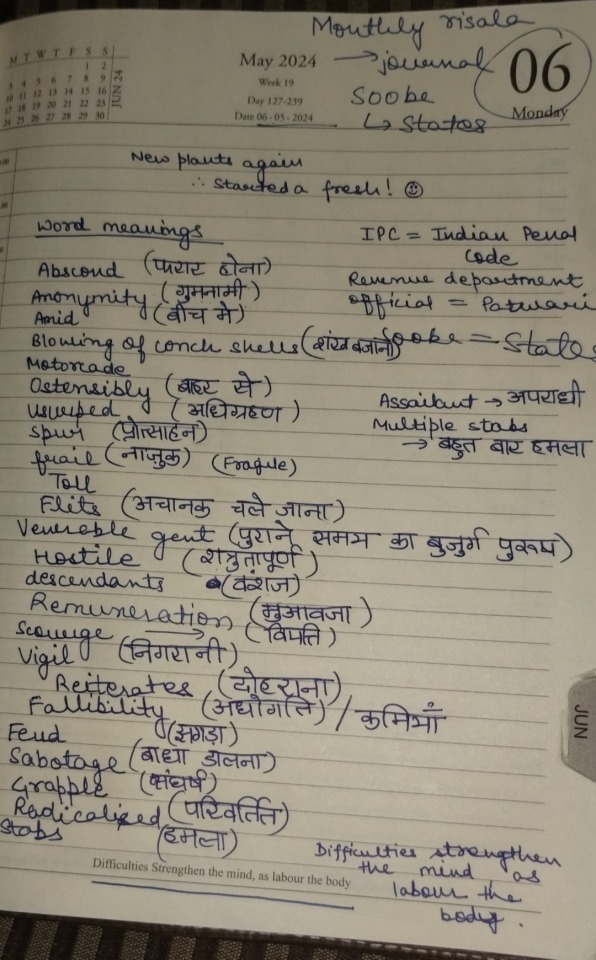
Hope you'll get what is correct for you in your life ❤️✨
Best wishes & regards 🤗🍀
Manisha Mehta

1 note
·
View note
